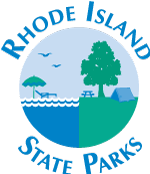Be Part Of The Solution, Not The Pollution.
Everyone who enjoys parks, beaches, and public outdoor spaces has a responsibility to keep them clean. Carry out what you carry in!
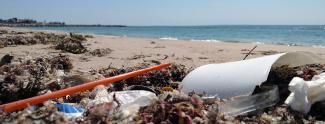
Show Your Love For Our Natural Spaces By Doing Your Part To Keep Them Clean.
Carry Out What You Carry In!
Everyone who enjoys parks, beaches, and public outdoor spaces has a responsibility to keep them clean. Consistent with this ethic, DEM continues to encourage visitors adhere to the carry-in/carry-out trash policy that has been in effect since 1992.
The point of our carry-in/carry-out policy is for visitors to take personal responsibility, take their trash with them, and leave no trace behind. We agree with the National Park Service and most state park systems across the country that this is a best practice because it promotes conservation, fosters a sense of stewardship, and leads to better visitor experiences.
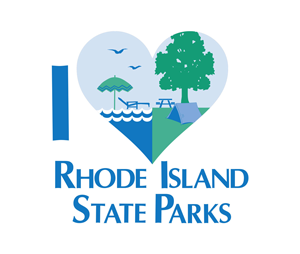
Our state's spectacular beaches, parks, and green spaces offer a dazzling diversity of experiences with 8,200 acres of parkland, 1,000 campsites, 400 miles of hiking and biking trails, 200 fishing spots, 25 parks, management areas, and nature preserves, and eight saltwater beaches. They attract more than 9 million Rhode Islanders and tourists a year.
Leave No Trace And The Seven Principles
The Leave No Trace Center for Outdoor Ethics is a non-profit organization that works to educate people on responsible ways to enjoy and experience the outdoors. To do this, they created the Leave No Trace Seven Principles (below) as guidelines you should follow every time you’re out in nature.
- Plan Ahead and Prepare: Know the regulations and special concerns for the area you'll visit. Prepare for extreme weather, hazards, and emergencies.
- Travel on Durable Surfaces: Going off the trail damages plants and can create trails where they shouldn’t be. Read signs and follow trail markers so you won’t get lost.
- Dispose of Waste Properly: Carry out what you carry in! Bring a baggie to store your trash and dispose of it properly when you leave.
- Leave What You Find: Leave plants, rocks, and other natural features as you find them for others to enjoy.
- Minimize Campfire Impact: Follow the rules and don’t build fires where they aren’t allowed.
- Respect Wildlife: Observe animals from a distance; never approach, feed, or follow them. Make sure to keep your dog on a leash.
- Be Considerate of Other Visitors: Respect other visitors and protect the quality of their experience.
Smoke-Free Beaches
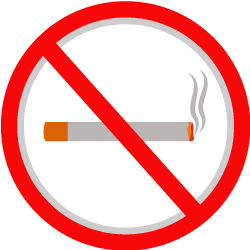
The RI Department of Environmental Management and the RI Department of Health ask all visitors to refrain from smoking at Rhode Island state beaches to reduce exposure to second-hand smoke and litter.
Lung health is important now more than ever. Smoke-free spaces are key when protecting your lungs. The associated litter from smoking is also a threat to children, wildlife, and the environment. We ask for your participation in helping to keep our beaches clean, healthy, and smoke-free.
If you are at a state beach and concerned about active smoking activity, report it to a Park Ranger or the Beach Manager located at the beach pavilion. Please do not report non-emergency activities to lifeguards.
Clean Beaches
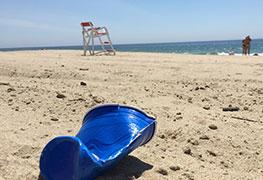
More than 1 million patrons visit state beaches between Memorial Day and Labor Day every year, and the sheer volume of customers during peak season inevitably strains services and creates challenges related to trash management. DEM rangers clean up trash on beaches and in the parking lots throughout the day; after hours, DEM beach-cleaning contractors send out crews to pick trash. By the next morning, contractors send other crews out combing the beaches and parking lots along with tractor rakes cleaning up excess litter and seaweed and smoothing the sand for the new day.
The top three categories of trash collected in beach cleanups in Rhode Island in 2018 were plastic and foam pieces less than 2.5 centimeters (so-called "tiny trash"), accounting for 28% of all beach litter; smoking-related litter consisting of cigarette butts, wrappers, and cigar tips constituting 25% of the total trash; and drinking-related trash at 23%, according to Save The Bay. Among the trash collected in the third category were plastic bottles, glass bottles, cans, caps, and plastic straws, lids, and stirrers.
DEM, which supports efforts to reduce plastic pollution, acknowledges that it has work to do reducing its own use of plastics. In an effort invest in and celebrate the state park system, the Department of Environmental Management (DEM) is working to improve trash and recycling services at state beaches and reduce litter in parks, beaches, and parking areas this summer. Visitors are encouraged to bring waste-free lunches and reusable meal and drink containers to the beach to help reduce the negative impacts of ugly and unsanitary trash on shorelines.
Pilot Program At Misquamicut State Beach
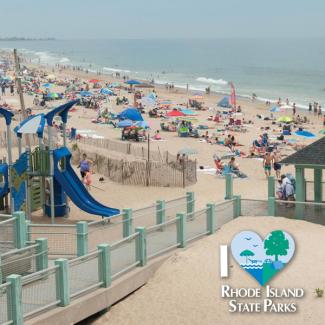
At Misquamicut, no bags will be available as part of a new approach being tested in collaboration with the Town of Westerly to address the problem of excessive trash left on the beach and in the parking lot. During the summer season, DEM positions dumpsters and recycling bins at beach entry points and the main pavilion. Misquamicut visitors – 80% of whom are from out-of-state – have access to these dumpsters to deposit trash and recyclables as they exit the beach and return to their vehicles. DEM has added additional seasonal employees at Misquamicut to monitor the containers and collect litter and trash from the parking area and beach.
Show your love for Misquamicut State Beach by doing your part to keep it clean. Dispose of your trash in the receptacles! Taking responsibility for our waste promotes conservation, fosters a sense of stewardship, and leads to better visitor experiences. Keeping our natural spaces clean is up to all of us so they can be enjoyed for generations to come.
